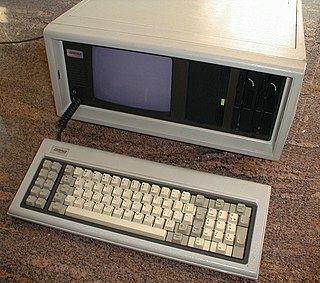
Lotus 1-2-3 is a discontinued spreadsheet program from Lotus Software. It was the first killer application of the IBM PC, was hugely popular in the 1980s, and significantly contributed to the success of IBM PC-compatibles in the business market.

A mainframe computer, informally called a mainframe or big iron, is a computer used primarily by large organizations for critical applications like bulk data processing for tasks such as censuses, industry and consumer statistics, enterprise resource planning, and large-scale transaction processing. A mainframe computer is large but not as large as a supercomputer and has more processing power than some other classes of computers, such as minicomputers, servers, workstations, and personal computers. Most large-scale computer-system architectures were established in the 1960s, but they continue to evolve. Mainframe computers are often used as servers.

IBM PC–compatible computers are technically similar to the original IBM PC, XT, and AT, all from computer giant IBM, that are able to use the same software and expansion cards. Such computers were referred to as PC clones, IBM clones or IBM PC clones. The term "IBM PC compatible" is now a historical description only, since IBM no longer sells personal computers after it sold its personal computer division in 2005 to Chinese technology company Lenovo. The designation "PC", as used in much of personal computer history, has not meant "personal computer" generally, but rather an x86 computer capable of running the same software that a contemporary IBM PC could. The term was initially in contrast to the variety of home computer systems available in the early 1980s, such as the Apple II, TRS-80, and Commodore 64. Later, the term was primarily used in contrast to Apple's Macintosh computers.

In the computer industry, vaporware is a product, typically computer hardware or software, that is announced to the general public but is late, never actually manufactured, or officially cancelled. Use of the word has broadened to include products such as automobiles.
Peter Norton is an American programmer, software publisher, author, and philanthropist. He is best known for the computer programs and books that bear his name and portrait. Norton sold his software business to Symantec Corporation in 1990.

CA Technologies, Inc., formerly Computer Associates International, Inc., and CA, Inc., was an American multinational enterprise software developer and publisher that existed from 1976 to 2018. CA grew to rank as one of the largest independent software corporations in the world, and at one point was the second largest. The company created systems software that ran in IBM mainframe, distributed computing, virtual machine, and cloud computing environments.

Compaq's first computers' form factors were portable, also called "luggables", and then "lunchbox computers", and together constituted the Compaq Portable series. These computers measured approximately 16 inches (410 mm) deep, 8 inches (200 mm) tall, and approximately 20 inches (510 mm) wide. As the products evolved, laptops and notebooks were created offing a new level of portability that caused the market to explode.

Thomas John Watson Jr. was an American businessman, diplomat, Army Air Forces pilot, and philanthropist. The son of IBM Corporation founder Thomas J. Watson, he was the second IBM president (1952–71), the 11th national president of the Boy Scouts of America (1964–68), and the 16th United States Ambassador to the Soviet Union (1979–81). He received many honors during his lifetime, including being awarded the Presidential Medal of Freedom by Lyndon B. Johnson in 1964. Fortune called him "the greatest capitalist in history" and Time listed him as one of "100 most influential people of the 20th century".

BMC Software, Inc. is an American multinational information technology (IT) services and consulting, and Enterprise Software company based in Houston, Texas.

The Compaq Portable is an early portable computer which was one of the first IBM PC compatible systems. It was Compaq Computer Corporation's first product, to be followed by others in the Compaq Portable series and later Compaq Deskpro series. It was not simply an 8088-CPU computer that ran a Microsoft DOS as a PC "work-alike", but contained a reverse-engineered BIOS, and a version of MS-DOS that was so similar to IBM's PC DOS that it ran nearly all its application software. The computer was also an early variation on the idea of an "all-in-one".
The BUNCH was the nickname for the group of mainframe computer competitors of IBM in the 1970s. The name is derived from the names of the five companies: Burroughs, UNIVAC, NCR, Control Data Corporation (CDC), and Honeywell. These companies were grouped together because the market share of IBM was much higher than all of its competitors put together.
International Business Machines (IBM) is a multinational corporation specializing in computer technology and information technology consulting. Headquartered in Armonk, New York, the company originated from the amalgamation of various enterprises dedicated to automating routine business transactions, notably pioneering punched card-based data tabulating machines and time clocks. In 1911, these entities were unified under the umbrella of the Computing-Tabulating-Recording Company (CTR).

Gilman Louie is an American technology venture capitalist who got his start as a video game designer and then co-founded and ran the CIA venture capital fund In-Q-Tel. With his company Nexa Corporation he designed and developed multiple computer games such as the F-16 Fighting Falcon flight simulator series. His company later merged with Spectrum Holobyte where he was CEO until its acquisition by Hasbro, after which he became Chief Creative Officer and General Manager of its Games.com group. He has served on a number of boards of directors, including Wizards of the Coast, Niantic, Total Entertainment Network, FASA Interactive, Wickr, Aerospike, the Chinese American International School, Markle Foundation, Digital Promise, and Maxar Technologies. He is chairman of the Federation of American Scientists and Vricon. He is a member of the President’s Intelligence Advisory Board and the U.S. Department of State’s Foreign Affairs Policy Board.

Following the introduction of the IBM Personal Computer, or IBM PC, many other personal computer architectures became extinct within just a few years. It led to a wave of IBM PC compatible systems being released.
William T. Coleman III was an American businessman who served as the CEO of Veritas Technologies. He was also a partner at Alsop Louie Partners. He was the founder, chairman of the board and chief executive officer of various high-profile corporations, including BEA Systems and Cassatt Corporation, and had been a director at Symantec Corporation since 2003.

Hitachi Data Systems (HDS) was a provider of modular mid-range and high-end computer data storage systems, software, and services. Its operations are now a part of Hitachi Vantara.

Harold D. Prewitt, Jr (Hal) is an artist, photographer, race car driver, businessperson, inventor of personal computer products and early pioneer in the personal computer revolution. He resides in South Beach.
Core International, Inc., commonly referred to as Core, was a multinational computer and technology corporation headquartered in Boca Raton, Florida, United States.
Ovation Technologies was a short-lived software company founded in Canton, Massachusetts, in December 1982 to create business productivity software for the then-emerging IBM PC and compatible market. Briefly named Spectrum Group Inc., the company was founded by Thomas J. Gregory, who also served as the company's president. Mike Walrod served as vice president of marketing.












